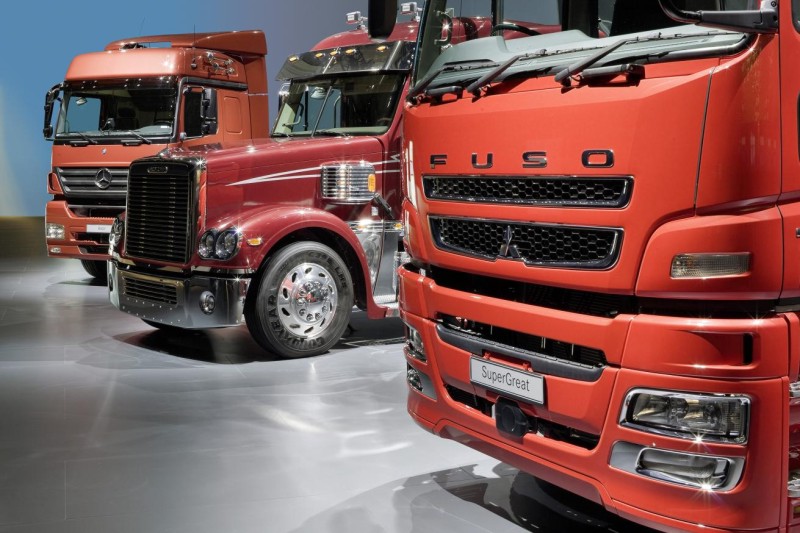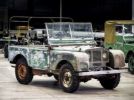MercedesBenz
Daimler Trucks Predicts Turnaround and Expects to Stabilize Earnings in 2010
At 259,328 vehicles, worldwide sales at Daimler Trucks plunged by 45 percent during the course of 2009. The division's revenues declined by 36 percent to €18,360 million. The fact that this drop was less pronounced was largely due to a more stable after-sales business. Daimler Trucks managed to maintain or even increase its market shares in the key regions.
As a result, Daimler Trucks maintained its global leadership in the medium and heavy-duty truck segments last year, despite the crisis. The division's EBIT nevertheless dropped to minus €1.0 billion (2008: €1.6 billion), due to the one-time charges from the regional programs at Daimler Trucks North America (DTNA) and Mitsubishi Fuso Truck & Bus Corporation (MFTBC) in Japan.
Today (10.03.2010) in Stuttgart, Andreas Renschler, member of the Board of Management of Daimler AG with responsibility for Daimler Trucks and Daimler Buses, explained the reasons behin
Regarding the outlook for the future, Renschler said, "Our industry has always been very cyclical, which is why we are prepared to deal with market declines. Nevertheless, it’s clear that truck manufacturers will be hit particularly hard when the world economy contracts in a more dramatic manner than ever before. Conversely, however, it's also true that when the economy recovers, truck manufacturers also recover, because you can't have economic growth without freight transport or trucks."
Effective cost and efficiency management in the crisis year:
The market downturn in 2009, which far exceeded normal cyclical fluctuations, led Daimler Trucks to significantly intensify its cost management measures and launch new efficiency programs. These measures are based on the Global Excellence Program. In addition to the consistent emphasis on making the division resistant to cyclical effects, the Global Excellence Program includes measures for the active management of costs and efficiency, the penetration of new growth markets, and the development of future product generations and technologies.
The company's focus in 2009 was on the two pillars of efficiency and resistance to cyclical effects. The high degree of flexibility in Daimler Trucks production plants in Germany proved to be effective. These plants can deal with a market contraction of up to 30 percent without having to resort to any special measures. Renschler emphasized that "the great flexibility of our plants combined with short-time work allowed us to avoid layoffs in Germany and at the same time retain our permanent employees and their know-how, despite an almost 50-percent drop in demand. We do not have such opportunities in other markets, which is why personnel reductions became unavoidable elsewhere, for example in the U.S."
Penetrating new markets - Substantial growth momentum in the BRIC countries:
In 2009, the effects of the economic crisis were dramatic in the triad and initially in the BRIC countries (Brazil, Russia, India, and China). Sales of new trucks declined severely in Russia, for example. However, developments in Russia are once again pointing toward growth.
These new growth markets have increasingly developed into a counterweight to the triad regions, and they will post stable growth momentum this year. China, for example, expects its market to rise to record levels this year, while Brazil is employing targeted incentives to stimulate its domestic market. Mercedes-Benz do Brasil, for its part, is investing in the expansion of its production capacities and in local research and development.
Daimler Trucks is rigorously continuing its efforts to penetrate the BRIC markets, because it already sells one out of two trucks outside of the triad markets and around 13 percent of its sales take place in the BRIC countries. Andreas Renschler says: "At Daimler Trucks we are taking a customer-and market-driven approach toward penetrating these growth markets. The shape that our presence in a market takes — whether we penetrate the market through a partnership, a joint venture or a holding company — depends on the conditions in the country in question.
We respond very individually to market conditions, and thus we make sure we have comprehensive know-how regarding each market."
Global modular system - Modernization of the entire product range:
Daimler Trucks invests heavily in new products. The company did not cut its investments in research and development in 2009, which remained at the 2008 level of around one billion euros. Not only is Daimler Trucks investing in the successor generations of the current models in its portfolio; the development of new environmentally friendly drive system technologies and vehicles is also moving ahead at full steam in 2010.
In the process, the company has taken a big step forward in terms of taking advantage of economies of scale. The backbone of the system is a global modular truck system that is defined across brands, from which future components, powertrains and products are developed and can be adapted to market-specific requirements.
The focus in all of this is always on the customer, who receives customized products or components that are in line with his or her needs.
Renschler also spoke about the product offensive at Daimler Trucks. "Our agenda includes many new trucks, the development of alternative drive systems, and compliance with the worldwide emission standards. Running all of these projects in a difficult economic environment is a big challenge for us. It would, of course, be easier to just cancel projects. But that would be the wrong step to take, because the global product offensive will provide us with the competitive edge we need in the future."
Extension of leadership in global truck business in 2010
"The Daimler Trucks business system proved its effectiveness in 2009. That gives us reason to be optimistic about how things will develop after recovery sets in. While the division remains cautious in its forecasts regarding future economic developments, the way our incoming orders are developing at present indicates that the global truck market has bottomed out. Many regions show indications of at least the beginnings of a market recovery.
Nonetheless, 2010 will be a challenging year. The general mood concerning the global economy is reserved, and it will take years before we once again reach the level we had attained before the crisis,� said Renschler commenting on the outlook for 2010.
"We have an EBIT target of €200 million, and we want all of our business units to be in the black. Boosting efficiency will be just as important as increasing revenues. To achieve these goals, we will be launching a comprehensive product campaign as well as a consistent market offensive. Although this is an ambitious goal, our fantastic team and our strategic approach make us well prepared to face the challenges.
Downturns show you if you are well positioned. We now know that our business system can handle what has been the biggest crisis in our history, and this gives us reason to be optimistic about how things will develop after recovery sets in.�
Mercedes trucks have been extremely popular in the Middle East and North Africa over the past 40-50 years, with some of them even still being manufactured in the region.
Related articles:
#SaferCarsForEgypt
 Want to sell your used car or buy one? Then check out our new used car market section
here!
Want to sell your used car or buy one? Then check out our new used car market section
here!
 Looking for a good service center or aftersales customer service? Did you have any bad experience with your car dealer or service center? Then check our 'automotive evaluation charts'
here!
Looking for a good service center or aftersales customer service? Did you have any bad experience with your car dealer or service center? Then check our 'automotive evaluation charts'
here!
Is Egyptian car market corrupt or collapsing?

Is the Egyptian car market collapsing or is it just a corrupt and unprofessional car market?
This is surely one of the most asked questions these days. Everybody is asking ...
AutoArabia Consulting
Middle East Car of the Year

Read more
Crash Test Results

Subscribe





 Mercedes Benz Egypt: Questionable sales practices and ...
Mercedes Benz Egypt: Questionable sales practices and ... LAND ROVER’S 70TH ANNIVERSARY BEGINS WITH RESTORATION ...
LAND ROVER’S 70TH ANNIVERSARY BEGINS WITH RESTORATION ... Bad start for Mercedes E-Class in Egypt: Daimler ...
Bad start for Mercedes E-Class in Egypt: Daimler ... Mercedes Benz E180 in Egypt – Top or Flop?
Mercedes Benz E180 in Egypt – Top or Flop? IAA 2016 - Daimler Trucks unveils Mercedes Benz Urban ...
IAA 2016 - Daimler Trucks unveils Mercedes Benz Urban ... Iconic Mercedes G-Class becomes a legend also in Middle East
Iconic Mercedes G-Class becomes a legend also in Middle East First Regional Center for Daimler commercial vehicles ...
First Regional Center for Daimler commercial vehicles ... Mercedes-Benz Egypt and NATCO open most luxurious 3S ...
Mercedes-Benz Egypt and NATCO open most luxurious 3S ... Mercedes Benz Egypt organizes Safety Driving Training ...
Mercedes Benz Egypt organizes Safety Driving Training ... Detroit Motor Show 2014: World premiere of the ...
Detroit Motor Show 2014: World premiere of the ...




